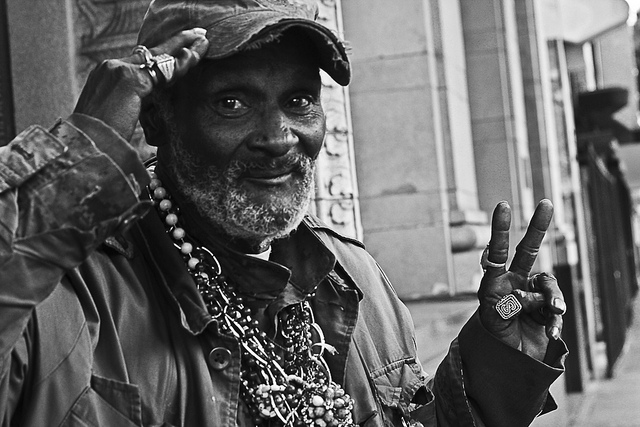
The Roosevelt/Taylor exit in South Loop Chicago is what I look forward to seeing the most after a long day of commuting.
It’s my symbol in the sky, my own personal Batman symbol giving me hope that I will be home soon. I pull onto that exit ramp and feel high on life. After all, I did just dominate rush hour traffic and now have the privilege of inhaling the world-famous Chicago hot dog smell, emitting its scent and temptation to all that exit here.
I notice a line, most likely tourists. This majestic city and its politicians do an amazing job of marketing to tourists.
As I stop at the red light at the top of the exit ramp, my headlights shine like a spotlight on a black man; my guess is that he is in his 60s by the grey hair in his overgrown beard. I can’t help but notice his bare, chapped hands and filthy fingernails gripping onto his discolored McDonald’s cup, a piece of litter he surely picked up on the side of the road and is now using as his piggy bank. It’s frigid cold outside and he is wearing tattered shoes. I can see his big toes sticking out of the worn out sneakers that clearly do not fit. He is now about six inches away from my driver’s side window.
He doesn’t say a word. He simply gazes at me.
I have lived in this city for years so the sight of a homeless person doesn’t shock me. I used to try to avoid eye contact. I thought, “If they don’t see me look at them, then they won’t expect me to give them any money and I can just move on driving home without thinking twice. If they remain invisible, then there is no world problem to solve. My world just keeps on turning…”
But this time was different. I looked into his eyes and he looked into mine. Almost as if he was pleading for me to see him, not just on the surface, but really see deep into his soul. This moment seemed to last forever. A dusting of guilt took over my entire body and just as my eyes started to fill up with tears of sorrow, I was abruptly interrupted by the obnoxious sound of a black Porsche, the driver laying on the horn, letting me know that I wore out my welcome at the light that had turned green at some point during my soul-seeking moment with the homeless man on my left. Time to keep moving.
As a kid growing up in a Catholic School, I remember having to recite the Ten Commandments. Now, 30 years later in my recovering Catholic years, I can still remember some of them, but one in particular stands out—“love thy neighbor.” As I look around this city, this state, this country, I don’t see people loving thy neighbor.
I wonder what my city politicians must think. They work less than a mile from a bridge where communes of homeless people sleep every night. I know they have to pass under the bridge to get to and from work. I guess they all play the “don’t make eye contact game” too.
The systems that were meant to serve and protect have failed—they are now broken. “Love thy neighbor” is something that is preached, but rarely practiced. Compassion is a scarce and precious gem. And I don’t mean the kind of compassion where you throw a nickel or dime at someone. I mean the kind that requires looking at a person as a human being, a brother and a sister.
As we prepare to enter another painful election year, I can’t help but wonder who the next savior of our broken system will be. I would vote for a modern day Robin Hood if I could, but I’d settle for someone who can actually look a person in the eye.
For the next mile, I couldn’t shake the sadness, anger and shame I felt. How did the man get there? What was his story? How does he survive in this cold out on the streets? Where is his family, friends, politicians, pastors, anyone? How could they all abandon him like that? The way that I just abandoned him, and that obnoxious Porsche driver behind me, and that car after that, and the car after that. How many cars drove by him today without offering so much as a penny or a bottle of water? Maybe he will get a sympathetic tourist to throw him a few bucks, or perhaps they will ignore him out of fear. I know one thing, they definitely won’t share their hot dog with the hungry man. How is this fair?
“Come on Lindsay, shake that, you have worked hard your entire life. It’s not your fault you are here, in the comfort of your heated car, and he is there begging for his next meal.” This is the sh*t I try to tell myself. But it is my fault. I am part of this world, not just my own world. He is a human being, not trash on the side of the road.
I live in a city where millions of people, just like me, habitually walk over homeless people as we chat away on our $500 smart phones, making our plans for the weekend. What happened to humanity? “Can you help a brother out?” is a very clear question—did we all go deaf? When did we become so self-centered that we judge people asking for help? I can hear my critics now: “Those people should go get a job; they probably make more money begging than I do all day working. They are a stain on our beautiful post card image of the lakefront.”
Come on people, it’s 20 degrees outside and this man is begging for change on the side of the road. But I am not judging you; all I could muster was a gaze. I am asking my fellow human beings to stop and look with me, that’s way more than our politicians do. You aren’t an enabler if you stop and look, or answer a person who asks for help. Here’s an experiment—take the time to look at the person and respond with a polite “no” or ask, “What can I do for you?” Try it. Your whole world may just change.
Author: Lindsay Bartels Beaudoin
Image: EsotericSapience/Flickr
Editor: Nicole Cameron; Travis May






Read 0 comments and reply